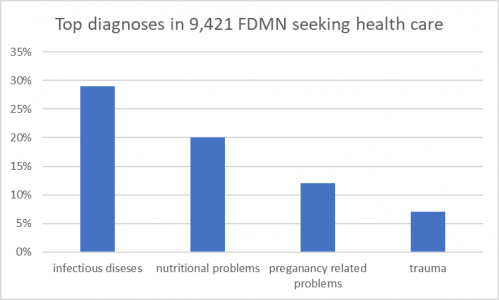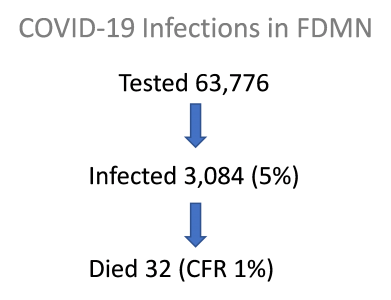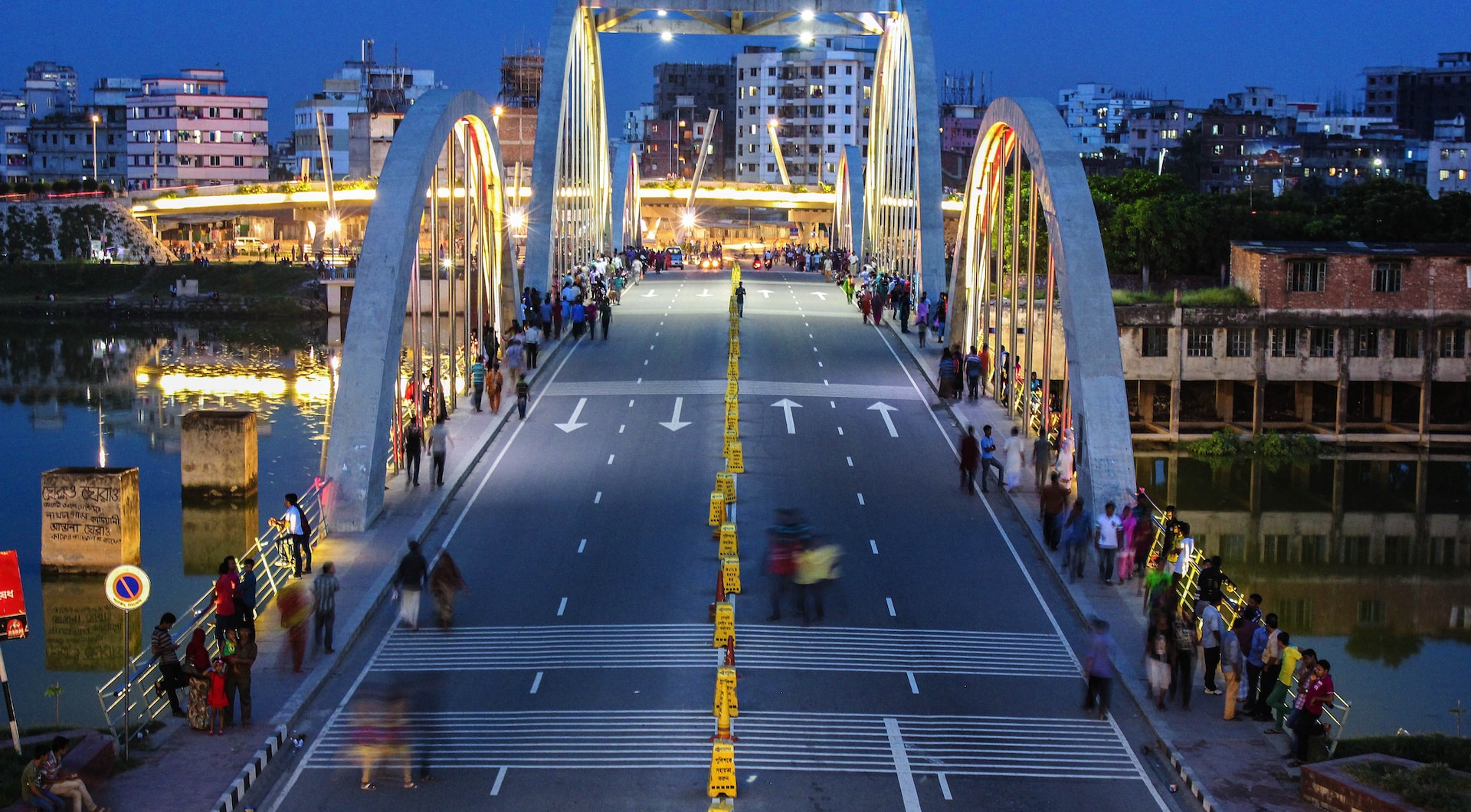The International Court of Justice (ICJ) has resumed hearings in the allegations that Myanmar’s military committed genocide against the country’s Rohingya minority in 2017. Away from legal discussions at the Court, more than a million Rohingya people continue to live as refugees in other countries, with Bangladesh home to the largest number of them. Here Abul Faiz, Jacqueline Deen, Arjen Dondorp and Lorenz von Seidein present a health snapshot from their research with over 9000 Rohingya people at Cox’s Bazar, Bangladesh, to argue that the international community must show greater commitment to resolving this issue if justice is to be done not only to Rohingya people but to Bangladesh as well.
The UNHCR estimated that at the end of 2020, 82.4 million people worldwide were forcibly displaced. The global number of refugees and asylum seekers has doubled from about 13 million in 2010 to nearly 26 million in 2019 and is expected to continue to increase. The majority of refugees are from Syria, Palestine, Venezuela, Afghanistan, South Sudan and Myanmar. The burden of dealing with the world’s displaced people has fallen mainly on developing countries.
Bangladesh, a Lower Middle Income Country, has been hosting what became the largest refugee settlement in the world in 2017, in its Cox’s Bazar district. Bangladesh, which is not a signatory to the UN Refugee Convention, terms the refugees in this camp as Forcibly Displaced Myanmar Nationals (FDMN). Bangladesh generously shelters the FDMN in their hour of need, but they are stateless people classified neither as citizens nor refugees, but as nationals of another country. They have no freedom of movement or right to work, and their access to education and healthcare is limited.
The Government of Bangladesh has, therefore, explored processes of relocation and repatriation for their settlement. In 2015, the Bangladesh government proposed resettling the FDMN to Bhasan Char, a 40 square kilometre island located in the Bay of Bengal. FDMN leaders and international agencies have been sceptical about the logistical challenges and safety of the process. By January 2022 the office of the Refugee Relief and Repatriation Commissioner (RRRC) indicated that 21,000 FDMN have been relocated to Bhasan Char and an additional 80,000 to 90,000 FDMN will be relocated in due course. Human Rights Watch has voiced concerns regarding the safety of settlements on Bhasan Char.
The FDMN originally belonged to the Rohingya Muslim minority group who resided in Rakhine state, Myanmar. Rohingyas in Myanmar have been persecuted for decades and effectively denied citizenship rights but the largest numbers of Rohingyas were forced to migrate in 2017 following a widespread operation by Myanmar’s military. The International Court of Justice is hearing a case that the country committed genocide against its Rohingya minority and the latest round of hearings began from 21 February 2022. The representatives of Myanmar’s military junta have challenged the jurisdiction of the World Court. In a cruel twist Aung San Suu Kyi, who led Myanmar’s defense team during the 2019 hearings, has since been deposed by the military, must defend herself in court, and has been formally replaced in the proceedings in The Hague.
Studies have alleged that the Rohingya suffered an estimated 24,000 killings, 18,000 instances of sexual violence and 392 cases of their villages being razed to the ground by state and non-state actors in Myanmar. As a result, by January 2018 over a million Rohingyas were forced to escape to neighbouring countries, over half came to Bangladesh. Although the governments of Bangladesh and Myanmar signed a memorandum of understanding in 2017 regarding the repatriation of FDMN to Rakhine state, the civil war in Myanmar following the overthrow of the elected government in January 2021 makes any repatriation of FDMNs in the near future unlikely.
A Health Snapshot
The legal complexities around the ‘statelessness’ find a human face in the overburdened infrastructural facilities in Cox’s Bazar. In 2021 we published a study describing the healthcare provision for FDMN in Cox’s Bazar. More than 150 national and international agencies provide health services in the camps, but the more than doubling of the population in the area in 2017 has added an enormous burden to the local healthcare system.
From July 2018 to December 2019, we interviewed 9,421 FDMN seeking health care . The results are presented in Figure 1.

Figure 1
Source: © Authors
As clear from Figure 1, the high incidence of infectious diseases and nutritional problems reflects the difficult living conditions of the FDMN. Hospitalised FDMN also tend to be admitted for longer periods than the Bangladeshi patients. The local healthcare providers believe this difference is due to the FDMN medical conditions being relatively complex and in a more advanced stage compared to those of local patients. Rudimentary health literacy is a recognised problem in the FDMN population.
We concluded that
Since then the COVID pandemic has hit Bangladesh hard, with 1,936,837 COVID-19 cases and 28,990 deaths reported as of January 2022. Data for FDMN are presented in Figure 2.

Figure 2
Source: Authors’ calculations from data
Note: CFR is Case Fatality Rate
People over 55 years have been offered COVID-19 vaccination. By October 2021 some 33,386 FDMN had been vaccinated against COVID-19. In contrast, as of February 2022 62% of the general population of Bangladesh has been vaccinated against COVID-19. But COVID was only the latest of several outbreaks in the overcrowded camps. In January 2022 close to one million (918,841) FDMN still lived in camps in Cox’s Bazar, Bangladesh, including 70,000 young children born there. FDMN are a relatively young population: 52% are under 18 years and only 4% are over 60. They are recognised as a vulnerable population at a particularly high risk for infectious disease outbreaks, food- and water-borne diseases, malnutrition, reproductive health issues and importantly, mental health issues.
In 2017–18 the people having to live in the camps suffered measles and diphtheria outbreaks and, considering the crowded conditions and limited sanitation in the camps, a potentially catastrophic cholera outbreak was feared. In a joint effort between the Government of Bangladesh and several international agencies 900,000 doses of oral cholera vaccines were administered in the camps in 2017. To our knowledge the vaccination campaign was a success: no cholera cases have been reported in the FDMN camps.
There were concerns that the crowded conditions, hot humid climate, and torrential rains could create an ecological niche for the outbreak of vector borne diseases, in particular malaria, which remains endemic in Myanmar as well as in Bangladesh. Fortunately, no such outbreaks have been reported.
The FDMN are just one group of the millions of refugees in the world. The FDMN camps in Cox’s Bazar illustrate that refugees create a massive burden on many aspects including the healthcare system of their host countries. It is not reasonable to assume that Bangladesh must carry this burden alone. More engagement and financial support of the international community is essential to set up a more appropriate healthcare infrastructure for refugee populations.
Perhaps more importantly the international community must exert its influence to reverse the conditions which have led to the refugee crisis in the first place. There are few permanent resettlement options. The coup by the military junta and the subsequent civil resistance in Myanmar have made a return of the displaced migrants to their country of origin even more unlikely than it was at the time of their arrival. Thousands of people have fled Myanmar for India and Thailand last year and the global refugee crisis will continue to grow.
Photo by s. m. Ibrahim on Unsplash.
The views expressed here are those of the authors and not of the ‘South Asia @ LSE’ blog, the LSE South Asia Centre, or the London School of Economics and Political Science.







